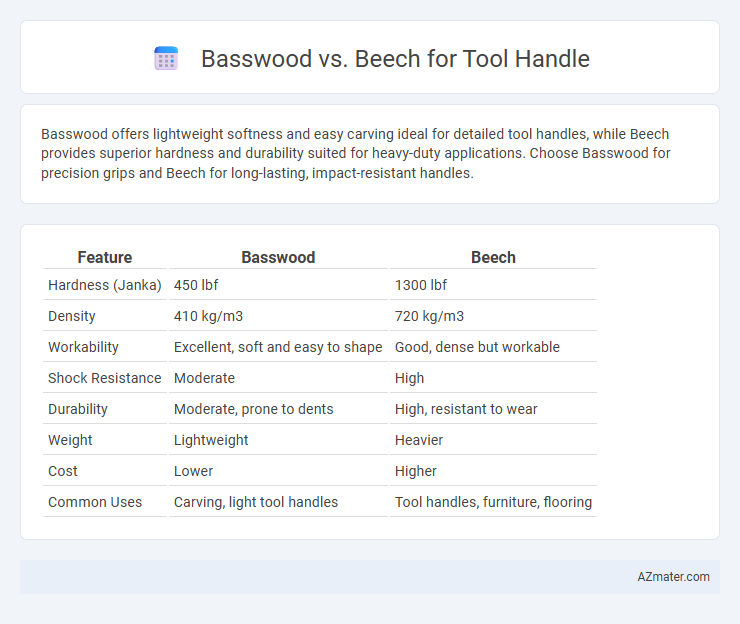Basswood offers lightweight softness and easy carving ideal for detailed tool handles, while Beech provides superior hardness and durability suited for heavy-duty applications. Choose Basswood for precision grips and Beech for long-lasting, impact-resistant handles.
Table of Comparison
| Feature | Basswood | Beech |
|---|---|---|
| Hardness (Janka) | 450 lbf | 1300 lbf |
| Density | 410 kg/m3 | 720 kg/m3 |
| Workability | Excellent, soft and easy to shape | Good, dense but workable |
| Shock Resistance | Moderate | High |
| Durability | Moderate, prone to dents | High, resistant to wear |
| Weight | Lightweight | Heavier |
| Cost | Lower | Higher |
| Common Uses | Carving, light tool handles | Tool handles, furniture, flooring |
Introduction: Comparing Basswood and Beech for Tool Handles
Basswood and Beech are popular choices for tool handles due to their durability and workability. Basswood offers lightweight properties and excellent shock absorption, making it ideal for precision tools, while Beech provides superior hardness and resistance to wear, suited for heavy-duty applications. Selecting between Basswood and Beech depends on the specific demands of the tool, balancing comfort, strength, and longevity.
Wood Properties: Density and Hardness
Basswood offers a lower density around 0.32 g/cm3, making it lightweight and easier to carve, while beech has a higher density near 0.72 g/cm3, contributing to its durability and strength for heavy-duty tool handles. The Janka hardness of basswood is approximately 410 lbf, indicating softer, more workable wood suited for detailed shaping, whereas beech rates around 1300 lbf, offering greater resistance to wear and impact. Selecting between basswood and beech depends on balancing the need for lightweight comfort against robust hardness for long-lasting tool performance.
Workability: Ease of Shaping and Finishing
Basswood offers superior workability for tool handles due to its soft texture and fine, even grain, making it easy to shape and finish with hand tools or machinery. Beech, while harder and denser, provides a smooth surface when carefully shaped but requires more effort to achieve a refined finish and may dull tools faster. Both woods produce durable handles, but basswood's ease of carving and sanding makes it a preferred choice for intricate designs and detailed finishing.
Strength and Durability
Basswood offers moderate strength with good shock resistance, making it suitable for lightweight tool handles but less durable under heavy stress. Beech stands out for its hardness and density, providing superior strength and long-lasting durability ideal for high-impact tool handles. Choosing beech over basswood ensures enhanced wear resistance and a more robust grip for demanding tasks.
Weight Considerations for Tool Handles
Basswood is significantly lighter than Beech, making it ideal for tool handles where reduced weight enhances user comfort and reduces fatigue during prolonged use. Beech offers greater density and strength, which can add durability but results in heavier handles that may cause quicker hand exhaustion. Choosing between Basswood and Beech depends on balancing the need for lightweight ergonomics versus the strength required for heavy-duty tool applications.
Shock Absorption and Comfort
Basswood offers superior shock absorption for tool handles due to its low density and fine, uniform grain, reducing user fatigue during prolonged use. Beech, while denser and harder, provides excellent durability but transmits more vibration, which may decrease comfort over extended periods. Choosing basswood prioritizes comfort and reduced impact, whereas beech emphasizes strength and longevity.
Resistance to Wear and Splintering
Basswood offers moderate resistance to wear with a smooth texture that reduces splintering, making it suitable for lightweight tool handles. Beech provides superior wear resistance and exceptional toughness, significantly minimizing the risk of splintering under heavy use. Its dense grain structure ensures long-lasting durability in demanding tool handle applications.
Cost and Availability
Basswood offers a lower cost and wider availability compared to beech, making it a budget-friendly option for tool handles. Beech wood, though more expensive, provides higher durability and resistance, which can justify its price for heavy-duty tools. Both woods are prized for their fine grain and comfortable grip, but basswood's affordability often makes it the preferred choice for large-scale or budget-conscious production.
Environmental Impact and Sustainability
Basswood and beech both offer sustainable options for tool handles, with basswood being a fast-growing soft hardwood that requires less energy for processing and has a lower carbon footprint. Beech is a dense hardwood known for durability, typically sourced from managed European forests that emphasize reforestation and responsible harvesting practices. Choosing basswood may reduce environmental impact due to its rapid renewability, while beech provides longevity that supports long-term tool use and reduces waste.
Choosing the Right Wood for Your Tool Handle
Basswood offers a lightweight, fine-grained texture that absorbs shock well, making it ideal for delicate or precision tool handles. Beech provides superior hardness and durability, which resists wear and impacts, making it suitable for heavy-duty tool handles requiring longevity. Selecting between basswood and beech depends on the balance needed between comfort, strength, and specific tool use conditions.

Infographic: Basswood vs Beech for Tool Handle
 azmater.com
azmater.com